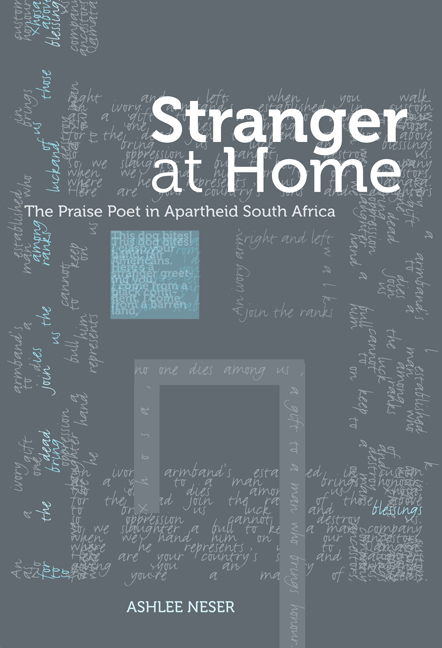four - Inventions for the record
from part two
Published online by Cambridge University Press: 17 May 2019
Summary
The majority of Manisi's recorded oral poems were produced in academic contexts manufactured to solicit and capture the poet's improvisations. Audiences for these occasions framed the poetry in terms of their varying composition and ability to comprehend Manisi's address. The micro contexts of the poet's university performances were shaped additionally by his shifting institutional identities – for example, from fieldwork subject, to festival participant, to university employee. Each of these incarnations affected the authority with which the poet addressed his audiences, although often paradoxically by investing his poetry with a bitterly ironic awareness of the deception of official identities: Manisi did not often lay claim in his poems to his occasional academic title, preferring rather to shame his audiences by identifying himself as one among Africa's unjustly dispossessed black masses.
Opland arranged most of Manisi's academic opportunities, and participated in the immediate conditions in which the poet produced much of his university corpus. Their collaborative relationship shaped the conventions governing their presentations, but was often a contentious framing issue in itself, contrarily interpreted by their American audiences to reflect the polarised politics of black exile in the United States. Whether hostile or congenial, Manisi's academic encounters yielded a body of recorded poetry that, indelibly marked by invention and compromise in the act of its performance, was mediated again by Opland and Manisi in their agreed translations. The tape-recorded and textual residue of his relationship with Manisi, as well as his memory of his encounter with the poet, has subsequently framed Opland's many discussions and re-presentations of Manisi's translated poems, most recently and fully in The Dassie. The corpus jointly produced by poet and scholar is marked by the length, experimentalism and inescapably political character of their nearly three-decade-long exchange.
The institutional inequality that characterised Manisi's relationship with his academic audiences was a principal subject of his poetry's criticism and exhortation. In this second section of the book, I argue that Manisi did not merely demonstrate his art for academics, but instead tried to engage them on political matters and in the terms provided by his genre. To understand and evaluate the highly mediated, unorthodox texts that resulted, I shall investigate how Manisi's local contexts of poetic production and mediation interacted with the apartheid paradigm, in terms of which rural poets were often misunderstood and undervalued.
- Type
- Chapter
- Information
- Stranger at HomeThe Praise Poet in Apartheid South Africa, pp. 135 - 169Publisher: Wits University PressPrint publication year: 2011



